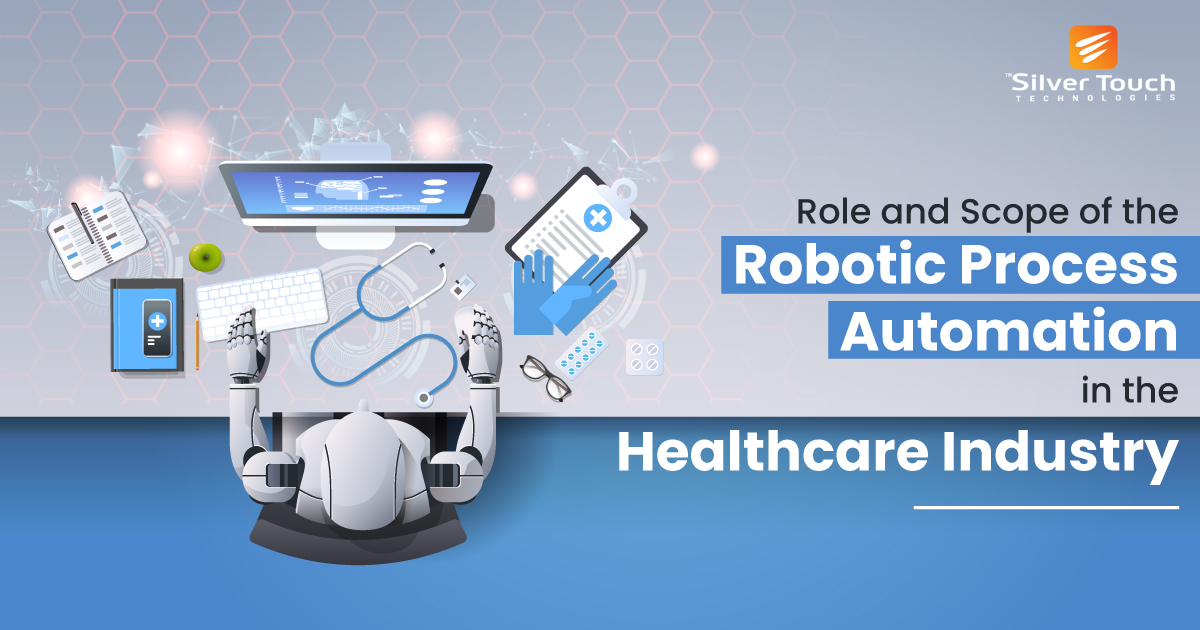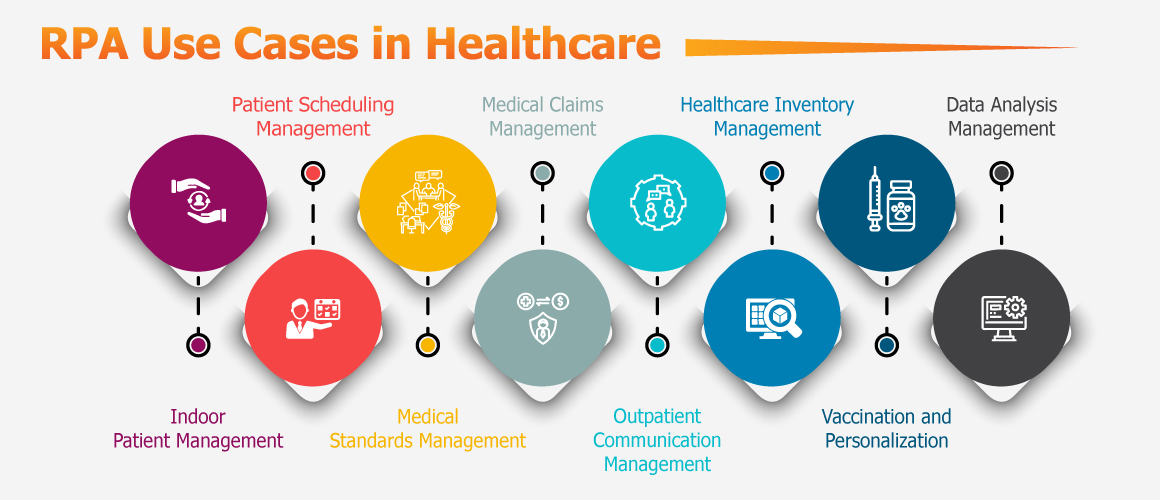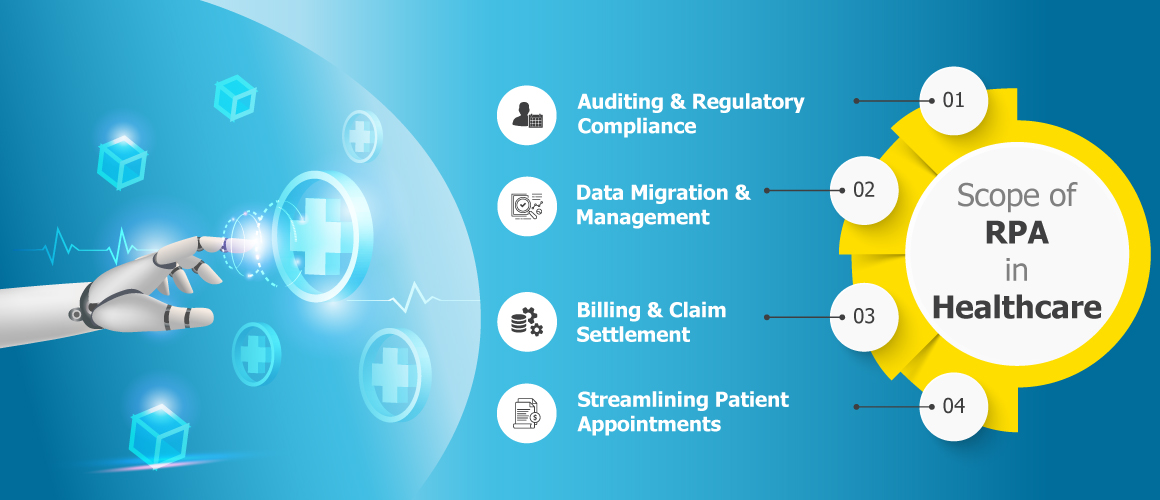The thriving healthcare industry faces major challenges like high volume and stringent compliance requirements. Healthcare professionals strive to prevent these challenges from taking a toll on the quality of patient care and the cost of services. Here, technology lends a helping hand. In this post, we are going to see the role of RPA in healthcare. We will also see the key benefits of robotic process automation and its use cases for this sector.
These days, it is of utmost importance to improve the patient experience while meeting prevalent regulations through digitalization. Along with this, healthcare organizations also feel tremendous pressure to keep costs in check. Robotic process automation in the healthcare sector can assist doctors and medical staff to meet all these objectives effectively. Before digging deep into this, let’s understand the importance and benefits of RPA in the sector.
What is RPA in the Healthcare Industry?
The advent of robotic process automation is a game-changer for the healthcare sector. The adoption of RPA in the healthcare industry brings drastic changes in the domains like medical insurance, patient engagement systems, and even accounting. RPA is about integrating pre-programmed software agents or ingenious bots into the system to conduct rule-based and repetitive tasks the way humans do.
The prevalence of RPA in the healthcare sector can save a lot of time and effort for healthcare workers. As bots can handle tedious back-office tasks on a 24*7 basis, healthcare professionals can focus on diagnostic work and seamless doctor-patient interactions. Be it processing transactions or triggering responses in real-time, robotic process automation technology always remains helpful for healthcare service providers.
Here are some of the big benefits of RPA for the healthcare industry.
Benefits of RPA in Healthcare industry
Emerging technologies like AI, ML, RPA, and IoT have made a huge impact on workflows and daily operations. When it comes to the healthcare sector, AI, ML, and RPA combine to give the benefits like,
Improved Patient Experience
Improved patient experience is the top priority for the healthcare sector. You can significantly improve back-office systems and bring in various self-service channels to give personalized experiences to patients.
Self-service portals and self-check-in kiosks remain highly convenient for patients as they can get rid of paperwork and wait for their turns for a long time. In a way, RPA in the healthcare sector can make a difference in patient care.
High Operational Efficiency
Robotic process automation solutions are designed for handling rule-based tasks. Talking about the healthcare sector, long wait times for patients and the complexity of IT systems can cause frustrations among the staff.
Here is what RPA can do for healthcare services- it brings automation in repetitive back-office processes and increases operational efficiency. As a result, patients can get improved services and healthcare professionals can work with more efficiency.
Reduced Overheads
Automation in the healthcare industry can reduce operations costs and improve financial management. With this, you can come up with new revenue streams while maintaining high standards in patient care services. As a result, operating costs and overhead remain low while all the processes run seamlessly. RPA in the healthcare sector is aimed at increasing efficiency and optimizing available resources for ensuring financial sustainability and maintaining high standards in patient care.
Minimal Chances of Human Errors
When your staff can get more time to focus on what they like as per their skills, the chances of errors can be decreased. Robotic process automation in the healthcare sector makes it possible by bringing automation to repetitive tasks. While improving diagnosis and medication practices, RPA can assist healthcare professionals to eliminate the chances of human errors. Automated systems need less human intervention, and therefore, the chances of errors can be reduced.
Better Health Management
Modern healthcare concepts like telehealth and remote patient monitoring (RPM) have contributed to preventing the spread and the perils of the COVID-19 pandemic. RPA can strengthen both these and other recent approaches in the healthcare sector by supporting collaboration and bridging the infrastructure gap. Doctors and case workers can make full reports of their patients and coordinate follow-ups efficiently with the help of IA. Such enhanced community health management can also assist doctors to make effective preventive care strategies.
How about looking at the top use cases of RPA in the healthcare sector?
RPA Use Cases in Healthcare
RPA has a vital role to play in managing various healthcare processes. Here are some of the use cases of the combination of IA and RPA in healthcare industry.
Patient Scheduling Management
Managing patient appointments and schedules of doctors take a large chunk of productive time for the healthcare organisation. It is not only a time-consuming process but also prone to human errors. Intelligent automation can facilitate self-service appointment booking systems and together with RPA, it is possible to send multi-channel communications to patients in a personalised way. Be it appointment confirmation, update, or changing time, an IA and RPA-powered system can manage the entire patient scheduling effectively.
Medical Claims Management
Claim settlement is also a big factor to consider for the healthcare sector. Swift and seamless settlement of medical claims requires an automated process. Here, IA and RPA work wonders by bringing automation to claims management. RPA can provide your healthcare organisation with digital workers who can manage communications between different parties and thereby reducing claim handling time. It also reduces the number of unpaid claims and keeps patients or their relatives updated about the status regularly.
Healthcare Inventory Management
Managing inventory is getting difficult amid the rise in the number of medical devices and surgical equipment. It not only takes more time for healthcare professionals but also requires more resources. However, RPA and IA can create a robust inventory management system that offers real-time reports on the status of healthcare supplies and makes orders automatically. Users can also view purchase and usage trends to manage healthcare inventory efficiently.
Data Analysis Management
Data can play a crucial role in the healthcare sector. Be it settling medical claims or identifying symptoms of infectious diseases, accurate data is always essential. RPA-powered software bots can fetch and share the necessary information by handling data entry and migration processes. It can make healthcare professionals free to focus on other core activities. RPA also promotes paperless data storage and management in your healthcare institute.
Indoor Patient Management
Taking admission into the hospital can be stressful for patients, and therefore, it is necessary for healthcare service providers to feel patients comfortable by offering them a smooth onboarding experience. IA can streamline patient onboarding by gathering the patient’s medical records and insurance information automatically. It makes it easy for the medical staff to get all the necessary records about the indoor patient and healthcare professionals can manage the entire process with ease.
Medical Standards Management
The healthcare sector is known for stringent regulations that are subject to frequent changes. As the regulatory environment keeps on evolving, healthcare service providers get new responsibilities in terms of protecting the patient’s confidential data and privacy. Also, it is necessary to keep all the records ready for annual reporting and auditing of medical practices. Here, IA and RPA can establish up-to-date systems to meet the prevalent standards.
Outpatient Communication Management
The recent pandemic has shown the importance of outpatient communication. On one hand, the COVID-19 pandemic has affected elective procedures and on the other hand, it remained instrumental in strengthening digital communication in the healthcare sector. RPA-driven digital workers can assist healthcare professionals to automate patient communication while saving valuable time for administrative staff and giving real-time updates to patients.
Vaccination and Personalization
This is one of the most noteworthy benefits of robotic process automation in the healthcare industry. While offering integrated care services, healthcare organisations need to focus on vaccine management and personalised experience for patients.RPA technology can come up with software bots that bridge the gap between vaccine manufacturers and healthcare service providers. Also, these bots can show the real-time status of the vaccine stock on the dashboard for ensuring effective management.
Scope of RPA in Healthcare
Robotic process automation has wide scope in the healthcare sector. Here we mention the most important domains in which RPA can be a game-changer in the near future.
Streamlining Patient Appointments
Before the advent of COVID-19, manual appointment booking was around 88%, but the pandemic has brought drastic change in this method. RPA medical bots can eliminate the manual process of appointment booking and scheduling processes. It further boosts patient engagement and reduces the chances of human errors and missed appointments.
Auditing & Regulatory Compliance
Integration of RPA in the healthcare sector enables service providers to track and record every stage of their workflows. In organised log files, the audit-related information is stored in organised log files and your healthcare organisation can comply with regular auditing. Also, robotic process automation-based software can keep the data confidential for meeting regulatory requirements.
Data Migration & Management
The healthcare sector relies heavily on paperwork, and therefore, it is necessary to introduce an automated data entry, migration, and extraction process. RPA technology can manage all data-related processes for saving time in monotonous data entry jobs. It also enables your organisation to get rid of extensive paperwork while offering real-time analysis of data.
Billing & Claim Settlement
Processing claims of health insurance is a fastidious and time-consuming process that is prone to errors. By integrating RPA in the medical insurance domain, time and effort can be reduced significantly. RPA bots can be integrated into the billing process to combine it with the claim settlement. A McKinsey report has revealed that the use of RPA in medical insurance could reduce claims processing costs by 30%. Also, patients can get the cashless facility in the healthcare organisation with a swift claim settlement.
Things to Consider when Implementing RPA in Healthcare
Indeed, RPA technology can transform the processes of your healthcare organisation. But, you need to consider various aspects while implementing RPA to get a high ROI in a relatively short period while improving patient experiences.
Some of these major factors are-
- Repetitive processes that you want to automate
- Inter Departmental activities and collaboration
- Infrastructure and other related facilities
- Core objectives and budgetary limitations
You can make a roadmap for RPA implementation by including all these aspects and consult a reliable and experienced RPA solutions provider. It is fair to mention that without having a proper roadmap and defining objectives, you can miss several benefits of this robust technology.
Why Silver Touch for RPA implementation?
As a trusted RPA partner, we offer 360-degree RPA services and solutions cost-effectively. We, at Silver Touch Technologies, know that integration of customised software bots into your existing system is challenging. Our dedicated and experienced RPA professionals can assist you to make it possible quickly.
Our vast array of RPA services include RPA consulting, RPA design & implementation, upgrade & maintenance, and automation support. We consider medium to long-term business goals of your company to make an effective RPA strategy. We also assist companies to bring automation and drive digital transformation irrespective of their industry sectors.
Conclusion About RPA in Healthcare
Easy implementation, seamless performance, and 24*7 availability are some of the top characteristics of RPA bots. You can reduce human errors and operating costs while increasing efficiencies and improving patient care services with the help of RPA. As one of the fastest-growing technologies, RPA will certainly enhance doctor-patient interactions by combining AI and ML in the coming years.
If you want to leverage all the benefits of RPA technology for your healthcare organisation, all you can do is choose the most suitable RPA solutions provider.
FAQs About RPA in Healthcare
RPA means automation in the healthcare sector. This emerging technology can save time by handling repetitive tasks of your healthcare organisation and reduce operational costs by streamlining the workflow.
RPA has multiple use cases in a thriving healthcare sector. It is useful in the billing process, claim settlement, health inventory management, and patient admission or scheduling management.
RPA not only saves valuable time and effort of healthcare staff but also reduces operational costs. It is useful for improving patient care services and ensuring better experiences for indoor and outdoor patients.
Automation can save the time of your staff in the healthcare organisation. They can focus more on other core processes as an automated system handles multiple routine activities. Other benefits are self-care services for increasing patient engagement.
RPA can be integrated in billing, claim settlement, and patient appointment processes to bring automation.
RPA or robotic process automation can bring revolutionary changes in the medical field. It can simplify processes, brings automation, and handles repetitive tasks to increase efficiency of healthcare professionals.







